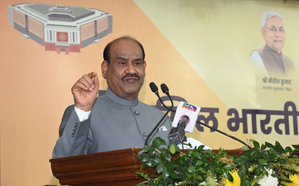
Patna, Jan 20 (IANS) Lok Sabha Speaker Om Birla on Monday highlighted key challenges and opportunities in strengthening parliamentary democracy while speaking at the All India Presiding Officers Conference in Patna.
Addressing the gathering, Birla emphasised the need for cooperation from all political parties to address disruptions in legislative proceedings, which he termed a serious challenge.
“Coming to the Well of the House, creating a ruckus, and adjourning proceedings are significant issues that require serious discussion. All parties must work together to resolve this. A serious decision must be taken here,” Birla said while speaking at the two-day programme.
He called for collective efforts to uphold the dignity and productivity of legislative institutions.
Birla, meanwhile, expressed satisfaction with the increasing adoption of digital processes in legislative assemblies across the country.
He said: "I am happy that digital work is now being done in most assemblies. If the proceedings of the Assembly and Lok Sabha are integrated into one platform, meaningful discussions will become more feasible. By 2025, we aim to achieve the goal of One Country, One Legislation.”
Birla also voiced concern over the declining frequency of Assembly sessions, urging presiding officers to ensure that legislative institutions remain robust and effective.
Reflecting on the legacy of the Indian Constitution, he said: "After years of discussion, Baba Saheb (B.R. Ambedkar) drafted a Constitution that not only guides India’s democracy but also serves as a model for democracies worldwide. We must further strengthen this institution."
The Speaker highlighted the historical role of Presiding Officers’ Conferences in shaping democratic traditions.
"Many significant decisions have been made in these conferences, both before and after independence. Democratic institutions have come closer to the people. We implemented many good traditions and laws that have played a crucial role in strengthening democracy," he said.
Om Birla also highlighted Bihar’s rich legacy of knowledge, spirituality, and political contributions.
The Lok Sabha Speaker Om Birla, while addressing the conference, spoke of Bihar’s pivotal role in shaping India's identity as a land of knowledge and inspiration.
"The land of Bihar is the land of education and knowledge. Institutions like Nalanda and Vikramshila have illuminated the world with their wisdom. This conference on this historic land will send a new message to our democratic institutions,” Birla said.
He paid homage to eminent personalities from Bihar, including the first President, Dr. Rajendra Prasad, who played a crucial role in framing the Constitution.
Birla also lauded Karpoori Thakur, a stalwart from Bihar, who devoted his life to fighting for the poor, and referenced Lord Buddha, whose teachings of compassion and peace originated from Bihar and resonate globally.
Rajya Sabha Deputy Chairman Harivansh echoed similar sentiments, underscoring the importance of rising above personal and party interests to strengthen democracy, as envisioned by B.R. Ambedkar.
Harivansh also took the opportunity to praise Bihar Chief Minister Nitish Kumar for his governance and transformative policies.
"After Nitish Kumar came to power in 2005, he not only focused on development but also worked to preserve Bihar’s heritage. In 2006, Bihar became the first state to provide 50 per cent reservation for women in local bodies, which was a revolutionary step," Harivansh said.
Bihar Assembly Speaker Nand Kishore Yadav, while welcoming the participants, emphasised the potential of the conference to reshape perceptions about Bihar.
"The misconceptions about Bihar will be removed by this conference," he asserted, highlighting the positive recognition Bihar received during the event.
The conference has been an occasion to celebrate Bihar's contributions to democracy and governance, while also deliberating on improving legislative practices.
However, the absence of both Chief Minister Nitish Kumar and Leader of Opposition Tejashwi Yadav drew attention. Their non-participation sparked discussions, with observers questioning the reasons behind it.
The conference aims to conclude with resolutions aimed at fortifying democratic institutions and fostering cooperative governance across states.
